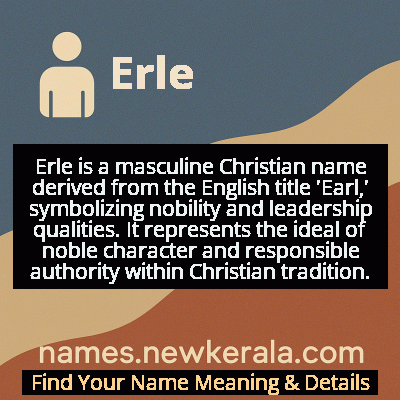Erle Name Meaning & Details
Origin, Popularity, Numerology Analysis & Name Meaning of Erle
Discover the origin, meaning, and cultural significance of the name ERLE. Delve into its historical roots and explore the lasting impact it has had on communities and traditions.
Name
Erle
Gender
Male
Origin
Christian
Lucky Number
4
Meaning of the Name - Erle
Erle is a masculine Christian name derived from the English title 'Earl,' symbolizing nobility and leadership qualities. It represents the ideal of noble character and responsible authority within Christian tradition.
Erle - Complete Numerology Analysis
Your Numerology Number
Based on Pythagorean Numerology System
Ruling Planet
Uranus (Rahu)
Positive Nature
Strong sense of order, loyal, practical, and disciplined.
Negative Traits
Stubborn, overly serious, rigid, and prone to feeling restricted.
Lucky Colours
Blue, gray.
Lucky Days
Saturday.
Lucky Stones
Blue sapphire.
Harmony Numbers
1, 7, 8.
Best Suited Professions
Managers, engineers, accountants, organizers.
What People Like About You
Dependability, discipline, practicality.
Famous People Named Erle
Erle Stanley Gardner
Author
Created the Perry Mason detective series and became one of the best-selling authors of all time
Erle C. Kenton
Film Director
Directed numerous Hollywood films including several in the Frankenstein and Abbott and Costello series
Erle Ellis
Environmental Scientist
Renowned ecologist and professor known for research on anthropogenic biomes and global environmental change
Name Variations & International Equivalents
Click on blue names to explore their detailed meanings. Gray names with will be available soon.
Cultural & Historical Significance
The cultural significance of Erle extends beyond its English origins to encompass broader European traditions of nobility and leadership. In Scandinavian cultures, the original 'jarl' represented not just aristocracy but also wisdom and judicial authority, as jarls often served as local rulers and judges. This multifaceted role adds depth to the name's cultural resonance, suggesting not merely privilege but also wisdom and fairness. The Christian adoption of the name reflects the religion's historical relationship with nobility and the concept of 'noblesse oblige'—the idea that privilege carries with it responsibility toward others. This makes Erle a name that embodies both secular and spiritual ideals of leadership, service, and moral responsibility across cultural boundaries.
Extended Personality Analysis
Individuals named Erle are often perceived as possessing natural leadership qualities, confidence, and a strong sense of responsibility, reflecting the name's noble origins. They tend to be decisive and authoritative when necessary, yet maintain a grounded perspective that allows them to connect with others effectively. Many Erles demonstrate strategic thinking and organizational abilities, making them well-suited for positions where planning and execution are crucial. Their personality often blends traditional values with practical wisdom, creating individuals who respect established systems while being capable of innovation when circumstances demand it. The name suggests someone who carries themselves with dignity but without pretension, someone who understands the balance between authority and approachability.
Beyond the obvious leadership qualities, Erles typically exhibit a strong moral compass and sense of duty that guides their actions. They are often seen as reliable and trustworthy individuals who honor their commitments and take their responsibilities seriously. This sense of integrity is frequently complemented by a protective nature—Erles tend to look out for those in their care, whether family, friends, or colleagues. While they may appear reserved initially, they usually possess deep loyalty to those who earn their trust. The combination of strength and sensitivity in their character allows them to navigate complex social situations with grace, making them effective mediators and advisors. Their inherent nobility manifests not as arrogance but as a quiet confidence that inspires respect rather than demanding it.
Modern Usage & Popularity
In contemporary times, Erle remains a relatively uncommon but distinguished choice for boys, often selected by parents seeking a name with historical depth and noble connotations without being overly popular. The name has maintained a consistent but low profile in English-speaking countries, particularly in the United States and United Kingdom, where it appears occasionally in birth records but rarely breaks into the top 1000 names. Its usage tends to be more frequent among families with English or Scandinavian heritage who appreciate its etymological roots. While not trending dramatically upward or downward, Erle represents a classic choice for parents valuing tradition and uniqueness simultaneously, often appealing to those who prefer substantial, meaningful names over fashionable options. The name's rarity in modern usage adds to its distinctive quality, ensuring that those who bear it stand out without being ostentatious.
Symbolic & Spiritual Meanings
Symbolically, Erle represents leadership, nobility of character, and inherited wisdom. The name carries connotations of stewardship and responsibility, suggesting someone who is meant to guide and protect others. Metaphorically, it evokes images of strong foundations, historical continuity, and the transmission of values across generations. The name symbolizes the idea that true nobility comes not just from birthright but from character and action—the earl as both a title and a responsibility. It represents the bridge between past traditions and present obligations, suggesting that those who bear the name are custodians of legacy while being fully engaged with contemporary challenges. This symbolic weight makes Erle a name that implies both privilege and duty, honor and accountability, creating a rich tapestry of meaning that transcends its simple etymology.

